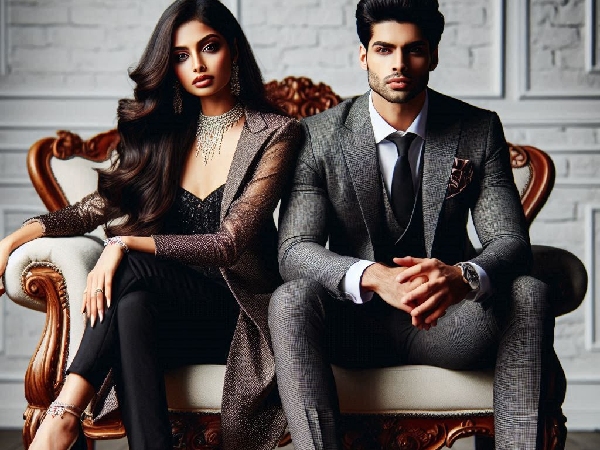In today’s world of innumerable dating terms, we’ve got ghosting, breadcrumbing, and now… “throning”. What is throning, you ask?
Essentially, it’s when someone “puts their partner on a throne” purely for social standing. It’s not so much about love or deep connection – it’s about dating someone for their social capital, their influence, and sometimes even just the glow of their status.
So, here’s a closer look at throning, why people are so drawn to it, and whether or not it’s a recipe for relationship success.
What Exactly Is Throning, And Why Is It A Thing?
Throning means dating someone not because you adore them, but because of what they represent socially. The term draws from the image of a throne partner, intentionally or not, and becomes a display item, a social status symbol that boosts the other person’s public image. So, it’s less “I love you for who you are” and more “I love you for what you represent socially.”
Why do people throne? Often, it’s about looking desirable or even untouchable to others. In a culture where we’re encouraged to flaunt success, this is an easy way to feel validated, even if it’s temporary. Many feel a certain thrill when their partner’s status helps them get into exclusive circles, elevating their sense of self-worth.
Why Throning Is Not That New
According to a 2018 survey of 1,000 users on a dating app, 9% admitted to dating for social gain, while 27% suspected they’d been used for the same purpose. This tells us throning isn’t just common; it’s edging towards the mainstream.
And maybe that’s not surprising. As Lucy Mangan, a British author, puts it, “New words make us look anew at old behaviours and help us avoid unconsciously accepting them as normal practice.” Throning might help people recognize when they’re being pursued for clout, not love.
If we’re being honest, dating for social gain is hardly a groundbreaking concept. Think of the royal families marrying within elite circles to maintain power, or wealthy merchants in olden times seeking to tie themselves to families of similar stature. The idea of using relationships to boost one’s position isn’t new – it’s just evolved with the times.
In a way, dating for social status makes sense in today’s hyper-connected world. Social media has pushed us to curate an image and seek validation, often above authentic connection. So, throning might be less a manipulation and more a reflection of what we value socially: success, popularity, and influence. After all, if relationships are built on shared values, then for some, that “value” is fame and power.
Social Media And The Rise Of The Throne
Social media fuels throning like no other. Instagram, TikTok, and even LinkedIn (yes, even LinkedIn) give us all front-row seats to the lives of the rich, famous, and influential. It’s never been easier to envy someone’s life, especially when their followers and their social reach seem like a shortcut to luxury and status. Why wouldn’t people try to achieve that through association?
With social media, it’s not just about who you know but about being seen with them. This fuels throning, where the online audience matters as much as if not more than, the connection between the two people. In India, where influencers like Priyanka Chopra Jonas and Virat Kohli lead glamorous lifestyles, their partnerships turn into brand-building exercises. Their relationships are inspirational for fans, making the quest for a “high-status” partner even more appealing.
A study from Science Advances found that people on dating apps seek matches who are about 25% “more desirable” than themselves, underscoring how we’re all, in some way, aspiring to “date up”.
But Isn’t Throning Just Another Word for Gold Digging?
There’s a key difference between throning and gold-digging: gold-digging comes with gender baggage, often pegged to women seeking money in relationships. Throning, however, doesn’t make these distinctions. It’s simply about social capital, and it’s equally accessible to anyone. Think of it as a modern, gender-neutral version of dating for gain without the loaded language.
Throning doesn’t view its “currency” in purely financial terms. Fame, clout, and network access have all become forms of currency, especially online. And because it’s seen as something that can go both ways, it comes with fewer judgments, allowing people to talk openly about dating for the perks rather than pretending love is blind.
Read More: Gen Z Is The Loneliest Generation, Leads Most Uncertain Lives
The Side Effects Of Throning
If you’re dating someone just for their social status, there’s a good chance your relationship won’t be emotionally fulfilling. Sure, there’s excitement in being admired for having a high-profile partner, but throning tends to lack depth. The “throned” individual might feel reduced to a prop, and over time, this could lead to frustration for both parties involved.
Moreover, throning perpetuates the idea that status matters more than qualities like kindness, humour, or emotional intelligence. It’s a trend that reinforces social hierarchies and power dynamics, allowing the social “elite” to stay atop the dating game. In the end, throning makes for a pretty unbalanced relationship where meaningful connection takes a backseat to public perception.
As The Swaddle points out, “The problem arises when one’s motivation to date another is driven solely by their social aspirations, rather than romantic interest, attraction, affection, and most other things that form the foundation of a relationship.”
Is Throning The Way Of The Future?
Throning may be a temporary thrill, but it’s hardly the foundation for a lasting relationship. In an age where “relationship goals” are defined by how good a couple looks in photos, it’s easy to see the allure. But most would agree that eventually, you want someone who’s with you for your mind, heart, and quirks- someone who doesn’t just “put you on a throne” for show.
So, the next time you think about flaunting your partner for clout, ask yourself if they’re just a status symbol or if there’s a genuine connection underneath. After all, dating should be less about showcasing someone’s worth and more about valuing them for who they are, behind the social media filters and clout-chasing filters of today’s dating world.
Image Credits: Google Images
Sources: Times of India, New York Post, The Swaddle
Find the blogger: Katyayani Joshi
This post is tagged under: dating trends, throning, social climbing, relationship dynamics, modern relationships, digital dating, clout chasing, online influence, dating culture, social capital, Indian relationships, millennials, gen z, relationship, advice, dating apps, social media
Disclaimer: We do not hold any right, copyright over any of the images used, these have been taken from Google. In case of credits or removal, the owner may kindly mail us.




































